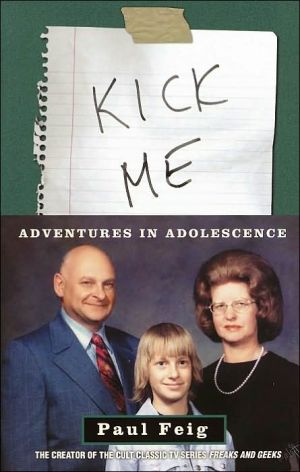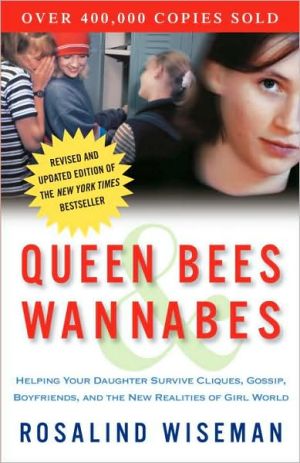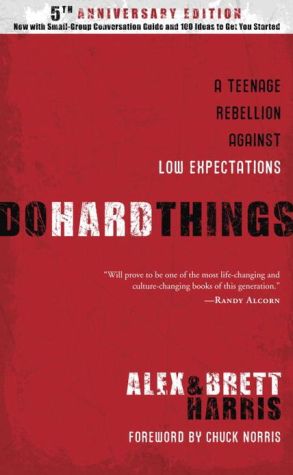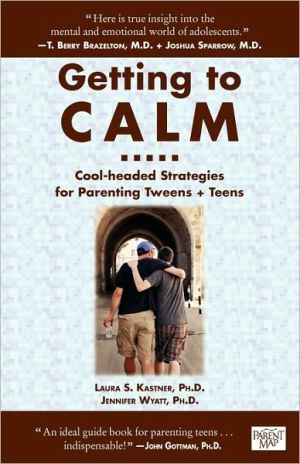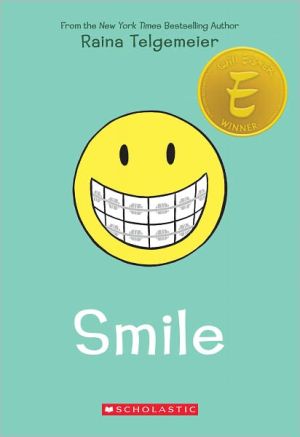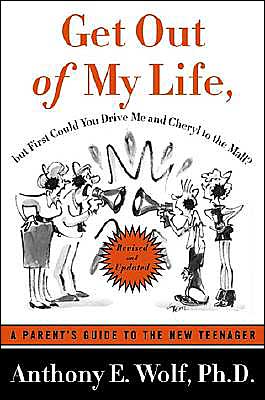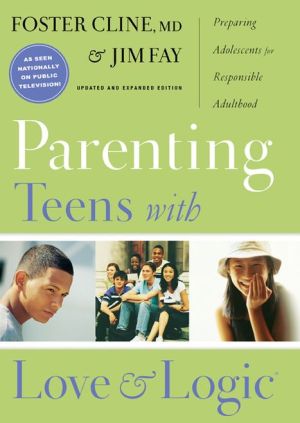Kick Me: Adventures in Adolescence
Written in side-splitting and often cringe-inducing detail, Paul Feig takes you in a time machine to a world of bombardment by dodge balls, ill-fated prom dates, hellish school bus rides, and other aspects of public school life that will keep you laughing in recognition and occasionally sighing in relief that you aren't him. Kick Me is a nostalgic trip for the inner geek in all of us.\ Author Biography: Paul Feig is a movie and television writer, director, and producer. He is a two-time Emmy...
Search in google:
Written in side-splitting and often cringe-inducing detail, Paul Feig takes you in a time machine to a world of bombardment by dodge balls, ill-fated prom dates, hellish school bus rides, and other aspects of public school life that will keep you laughing in recognition and occasionally sighing in relief that you aren't him. Publishers Weekly These interlocking essays on everything from a sadistic gym teacher and geeky after-class pastimes to obsessive romantic tendencies and a prom that wasn't the best night of the author's life are terrifically entertaining, although undoubtedly imaginatively amped up for maximum readability. Feig is the creator of the late-'90s sitcom Freaks and Geeks, a sort of Wonder Years for the Dungeons and Dragons set. Much of the show was based on Feig's own childhood, and this memoir is, in a way, the show's literary equivalent. After Mr. Wendell, Feig's seventh-grade gym teacher, orders a bunch of big, mean classmates to pile on top of Feig and pummel him as he stumbles out of the locker-room showers, the author recalls, "They all started to get off me one at a time, laughing and congratulating each other on a job well done.... All I could do was stand there and think about the fact that this was merely the first day of gym class. Nine more months of pre-teen locker room torture awaited me." But Feig gets the last laugh. Blessed with the sensitivity that landed him in such trouble when young, he lightly slices and dices the social cunning of all the bullies unfortunate enough to enter his orbit. True to form, Feig's mini-hit was canceled after one season, leading to a futile mass uprising, including a full-page ad in Variety, from his fans, who were disenchanted by yet another of life's downers. It is that very audience who will adore this originally written, imaginatively comic missive. (Oct.) Copyright 2002 Cahners Business Information.
WE STOOD IN LINE AT ELLIS ISLAND FOR THIS?\ There is no God. . . I mean, there can’t be. Think about it. . . If there were, then things in life would have to be fair. There would be no suffering, there would be no war, there would be no poverty . . .\ . . . and none of us would be born with last names that could make us the brunt of adolescent jokes for the entirety of our school careers.\ In a truly just universe, no child’s last name would be Cox, Butz, or Seaman. No teenager would come from a family named the Hardins or the Balls. A young Richard Shaft wouldn’t have to come home from school crying each day. An underendowed Lisa Titwell wouldn’t beg her parents to let her finish her education at an all-girls’ school. And an adolescent Paul Feig wouldn’t have had to endure hearing the letters e and i constantly taken out of his last name and replaced with the letter a.\ But, alas, I did.\ It didn’t start out that way. Fortunately, or unfortunately, when I was in grade school, there was a TV commercial for Fig Newton cookies that featured a man dressed up in a giant fig costume who performed a jingle called “The Big Fig Newton.” He would dance and sing the words “Chewy, chewy, rich, and gooey in- side . . . Golden, flaky, tender, cakey outside.” At the same time, he performed a goofy, vaguely Egyptian-type dance, and then, after a few more product-endorsing verses, would wrap up his corporate caperings by saying “Here comes the tricky part,” whereupon he would stand on one leg and grandly sing, “The Big . . . Fig . . . New-tonnnnnnn!”\ The commercial was very popular and something every kid in my school district strove to memorize in the hopes that he or she could then perform it in front of his or her peers and obtain big laughs. Because of this, and thanks to the free association of youth, I, Paul Feig, became known as “Fig Newton.”\ At first, I hated it. I mean, who among us really is happy when we’re assigned a nickname? It’s never a situation where we get some cool handle like “The Big Hurt” or “The Yankee Clipper” or “Stud.” It’s always some lame, obvious play on our names, turning the once proud crest of our ancestors into something that either has to do with a body part, a reproductive organ, a mental shortcoming, or an insensitive term for a person who practices nontraditional sexual unions. The kids I grew up with could bend the most innocent name into something you wouldn’t want to be called, even if it was preceded by the phrase “and the Oscar goes to . . .” Names as harmless as Smith and Jones could easily be twisted into Smegma and Boner, and so the journey from Feig to Fig Newton was little more than a quick trip to the local humiliation mart.\ The name spread fast and soon none of my peers could resist it. The greeting “Hey, Fig Newton” became so prevalent in my life that by the age of ten I didn’t even respond to my actual name. Paul Feig was someone from my past, a free spirit who had once played happily in his room, unaware that the world was filled with people who, unlike his mother and grandmother, didn’t think he was “The Boy Who Could Do No Wrong.” I was now Fig Newton, the kid who was known to burst into tears at the drop of a hat, who talked too loud and had trouble paying attention in class, and who had strange nervous tics like blinking his eyes, shaking the hair out of his face, and constantly tugging at the crotch of his pants because of a minor case of undiagnosed Tourette syndrome. No, Paul Feig was a private citizen, but Fig Newton was a walking target. And I wasn’t very pleased about it.\ The irony was, as with many things in life, I had no idea how good I really had it until it was too late. It happened on the first day of junior high. I entered the building, fresh from seven relatively safe years in kindergarten and elementary school, and was feeling both nervous and excited about this upgrade in rank. To be a seventh grader didn’t just mean you were one year older than a sixth grader. It meant that you had gotten through the first and longest leg of your precollege journey. You’d done seven years of the basics and were deemed worthy to step up to the next level. Life was going to be less about reading drills and times tables and using your finger to put spaces between the words you wrote with oversize pencils and more about scholarly pursuits. Feeling wise and mature, I marched proudly into my new homeroom and sat down near some friends from grade school. The teacher came in, and my excitement at my new academic surroundings grew. He was a handsome, too-cool-to-be-teaching-junior-high-school guy in his early thirties named Mr. Parks. He was the only teacher I’d ever seen at that point in my life who had a beard, and his cool quotient grew immediately once word got out that he had a guitar in his office. Mr. Parks started to call off our names from an attendance sheet. All of my classmates answered in the standard twelve-year-old’s socially backward mumble of “Here” or “Present.” I wanted to be different. I wanted to celebrate my new life in junior high with a hale and hearty “Right here, Mr. Parks,” just to let him and the world know that I was going to be a force to be reckoned with. I could hardly contain my excitement as he worked his way through the Ds.\ “Drabelski?”\ “. . . here.”\ “Drummond?”\ “. . . yeah.”\ When he got to Fazio, I knew that I would be next. I readjusted in my chair and took a breath, filling my diaphragm with a mouthful of air that was about to be transformed into my debut moment. Mr. Parks stared at the list, as if he were trying to figure something out. And then, uncertainly, he said my name.\ Now, for the record, my family has always pronounced our last name “Feeg,” which has stirred a lot of debate among my parents’ peers. In some countries, citizens pronounce the second vowel in a pair, which would make our name come out as “F-eye-g.” In other lands, people make the first vowel the dominant sound, as my ancestors had chosen to do. Well, for some reason, the melee of pronunciation rules in Mr. Parks’s head made him take the squishy middle road through the world of articulation, and he tortured out a version of my name that sounded exactly like this:\ “Paul . . . Fffff-aaa-ay-g?”\ The laughter was deafening. In grade school, I had always attempted to make people laugh and had been semisuccessful at it, but suddenly I was getting the biggest reaction of my life and I hadn’t done anything. And, more importantly, I didn’t want it. Because I knew that it wasn’t the good kind of laughing. I wasn’t entertaining my classmates with a pithy set of observations about the fact that the cafeteria menu for that day featured something called “Ben Franklin Beans,” nor was I pressing the heels of my hands against my mouth and blowing hard, creating the always laugh-inducing monster fart sound. And the phrase “we’re not laughing at you, we’re laughing with you” wasn’t anywhere to be found. I looked around at my school chums, quite perplexed at the response, thinking that these laughs were far too big for a simple mistake in pronunciation. It was at that moment that some kid I didn’t know who was sitting a couple of rows away looked right at me and said, “Paul Fag?”\ More laughs exploded, and I knew that I had just witnessed the birth of something horrible. It was bound to happen and, in all honesty, I don’t know why it didn’t happen sooner. The word “fag” had started to float around on the outer fringes of my peer group right around the fifth grade. But I guess that in grade school, a fig-filled cookie was funnier than a cruel term for something we didn’t understand. However, as I was about to find out, junior high was where the term flourished, and I had just been dubbed the Keeper of the Flame. As Mr. Parks tried in vain to quiet the class and regain order, I sat in the stunned realization that I had just seen the next several years of my life laid out for me.\ Fig Newton was dead. Long live Paul Fag.\ Even though it was of little consolation, I would come to find out that every guy was called a “fag” at one point or another during the day in junior high, and usually multiple times. There was no escaping it. Anything you did could cause you to be labeled a “fag.” If you carried a lunchbox, you were a fag. If you wore a wool cap on a cold day, you were a fag. If you carried your books in a knapsack, you were a fag. It all added up to fag. The only time you weren’t a fag was when you were calling somebody else a fag. And so, I guess that’s why everyone was always calling everybody else “fag” all the time. If an army’s shooting at you, raise a white flag, walk across the battlefield, and join them.\ The irony was that few of us had any idea what the word even meant. There was a vague knowledge that it was a derogatory term for a guy who likes another guy. But we all had friends who were guys and we all “liked” them in the most widely accepted usage of the word. And so, by that simple definition, I guess we all were fags. But as we moved to the next level of semantic understanding and were told by others in our group that the term referred to guys who liked to kiss each other, then we started to catch on. No matter how liberal or conservative our families were, no matter if our parents had brought us up to be tolerant and understanding of others or not, there was one thing we all knew we didn’t want to be accused of in junior high, and that was being a guy who liked to kiss other guys. And so began our six-year quest to not be called fag.\ But there was no escape. The word “fag” was part of the lexicon when I grew up. Guys couldn’t form sentences without it. They couldn’t articulate greetings. It was as if “fag” had been programmed into all of their DNA and set by Mother Nature to activate the minute they walked through the junior-high doors.\ That and the word “dick”. In some ways, “dick” was more popular than “fag”.\ “Hey, ya dick!”\ “What are you looking at, dick?”\ I think its vogue was probably due to the fact that we all knew exactly what a “dick” was. Which somehow made it even more painful.\ Guys whose actual names were Dick had it worse than I did with the name Feig. Because if you were named Dick, then you really were a Dick, and so you couldn’t even get mad or report your tormentor to the teacher because he could get himself out of it with an innocent look and an “I was just calling him by his name.” The more industrious Dicks in my town would always show up for their first day of school as Richards, but no self-respecting twelve-year-old looking to oppress would ever fall for that. To them, a Dick by any other name . . .\ There was only one way for a Richard to avoid being a Dick and it all had to do with the genetic lottery. Dorky Richards were automatically Dicks. But if a guy was good-looking and tough and cool and could actually kick the crap out of you if he heard you call him Dick, then that Richard would be called “Rick.”\ I always hated guys named Rick. Because anytime you heard a group of girls talking about who they were in love with and who they’d give a million dollars just to have as their boyfriend, it was always a Rick.\ “Oh, my God. Rick is sooooooooo cute. I can’t believe it.”\ “Rick is a total FOX.”\ “I’d do anything to go out with Rick.”\ Rick, Rick, Rick. It felt like every girl I ever had a crush on in school was in love with one Rick or another. And I never met a Rick who wasn’t a handsome guy. It always made me wonder if hospitals had some kind of naming service to properly identify different types of babies.\ “Well, Mr. Ramsey. It looks like your son is going to be quite a handsome lad, and one who will probably persecute and humiliate all the other male babies in this room someday. Might I suggest the name ‘Rick’?”\ So, the basic rule we learned early on was never call a Rick a dick. Or a fag. But the rest of us were fair game. There we were, trapped in our cinder-block prison, making our way through the endless days of homework assignments and pop quizzes, being called “fags” and “dicks” and “queers” and “homos” and any additional combination of those terms coupled with one or more parts of our anatomy. “Dick-head” or “fag-face” or “queer-ass” were all wonderful ways for your oppressors to break up the monotony of their daily name-calling grind.\ But around me, they were purists. There was no need to invent any new terms when fate had provided them the perfect target—to the guys in my school, I was, and always would be, Paul Fag.\ Except on the days when I accidentally wore white socks. Then, for some reason, I was called a “Polack.”\ Man, did I hate school.
\ Publishers WeeklyThese interlocking essays on everything from a sadistic gym teacher and geeky after-class pastimes to obsessive romantic tendencies and a prom that wasn't the best night of the author's life are terrifically entertaining, although undoubtedly imaginatively amped up for maximum readability. Feig is the creator of the late-'90s sitcom Freaks and Geeks, a sort of Wonder Years for the Dungeons and Dragons set. Much of the show was based on Feig's own childhood, and this memoir is, in a way, the show's literary equivalent. After Mr. Wendell, Feig's seventh-grade gym teacher, orders a bunch of big, mean classmates to pile on top of Feig and pummel him as he stumbles out of the locker-room showers, the author recalls, "They all started to get off me one at a time, laughing and congratulating each other on a job well done.... All I could do was stand there and think about the fact that this was merely the first day of gym class. Nine more months of pre-teen locker room torture awaited me." But Feig gets the last laugh. Blessed with the sensitivity that landed him in such trouble when young, he lightly slices and dices the social cunning of all the bullies unfortunate enough to enter his orbit. True to form, Feig's mini-hit was canceled after one season, leading to a futile mass uprising, including a full-page ad in Variety, from his fans, who were disenchanted by yet another of life's downers. It is that very audience who will adore this originally written, imaginatively comic missive. (Oct.) Copyright 2002 Cahners Business Information.\ \ \ \ \ Library JournalIn 1999, Feig created a critically acclaimed comedy-drama series for NBC called Freaks and Geeks. In it, he captured the experience of adolescence as lived by typical freaks and geeks in a Michigan high school, circa 1980. Unfortunately, the show was canceled after one season. With this collection of very funny essays, Feig once again captures the experience of teenagehood with all its insecurities, embarrassments, angst, and obsessions. The reader can't help but relate to at least a couple of his stories about growing up, throwing up, or simply giving up. Feig is adept at bringing his geeky past to life in stories about the inescapable hell of gym-class dodgeball, inevitable betrayals by members of the opposite sex, and a wacky episode about announcing his first high school football game. Kick Me took this reviewer on a nostalgia trip through his own adolescence. It is certain to release a rush of memories in all who have finally come to grips with the awkwardness of having grown up. Primarily for the humor section of public libraries, this work might also provide some insight for psychologists specializing in adolescence.-Joe Accardi, William Rainey Harper Coll. Lib., Palatine, IL Copyright 2002 Cahners Business Information.\ \ \ School Library JournalAdult/High School-Readers will find plenty to relate to in these true stories of teacher's pets, proms, and riding the school bus. The book succeeds because of the universality of the situations. Feig is not the first person to hate gym class, nor will he be the last, but he recounts his various experiences so vividly that a situation as common as snooping for presents in a parent's closet takes on an extra level of paranoia and humor. Most of the reminiscences are decidedly tame. The author panics when his school-dance date drinks a beer and panics again when he thinks that he might have to kiss her after the beer makes her sick-especially since he has never kissed a girl at all. Some of the stories read like a lighter David Sedaris-there is even one about Feig's stint as an elf, albeit in the first-grade Christmas pageant, rather than the Macy's of Sedaris's Holidays on Ice (Little, Brown, 1997). In fact, despite the subtitle, more than half the book takes place in elementary and middle school. Teens will find lots to laugh at and relate to in these tales of insecure geekdom, even though the events took place more than 20 years ago, in the time of Olivia Newton-John records and polyester pants.-Jamie Watson, Enoch Pratt Free Library, Baltimore\ \
